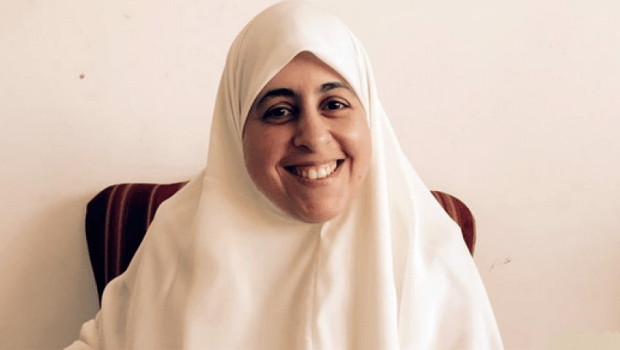
Aisha al-Shater has been held in dire conditions in prison since her arrest last year, according to rights groups
Aisha Shater, an Egyptian activist and daughter of senior Muslim Brotherhood leader Khairat al-Shater, could die in prison if not hospitalised for a serious health condition, a human rights group has warned.
Aisha al-Shater, 38, was arrested in November 2018, in a wave of detentions that targeted nearly 40 human rights workers in Cairo. She was charged with “belonging to an organisation established contrary to the law” and “inciting to harm the national economy”.
Her husband, human rights lawyer Mohamed Abou Horayra, was also arrested in the sweep and faces the same charges.
According to We Record, an online Egyptian rights network, Shater is suffering from a “bone marrow failure which has led to severe blood cell shortages in the platelets and erythrocytes in conjunction with bleeding,” one of the symptoms of the illness.
According to the group, Shater’s health condition is very dangerous as it “portends an inevitable premature death if Aisha does not receive proper treatment as soon as possible”.
Aisha al-Shater’s health has also been complicated following a hunger strike she started in September.
Since 18 September, she has only drunk water as she demands better prison conditions, including ending her solitary confinement and a ban on visits from her two children whom she has not seen since her arrest, London-based human rights researcher Ahmed Attar told Middle East Eye last month.
We Record said Aisha al-Shater has been receiving medication to activate bone marrow maternal cells as well as some supportive treatment such as blood and platelet transfusion. Despite a bone marrow examination finding that her immunity is “almost non-existent”, there has been no report on whether she has received much-needed antibiotics.
The group added that Al-Qanater women’s prison in Cairo has neglected Shater’s case, which further damaged her health.
She was, however, transferred to Kasr al-Aini Hospital for tests on 8 and 9 October but was then returned to prison. She was transferred for a second time to the same hospital on 31 October and remained there until 6 November, one day before her prosecution hearing.
“The Egyptian authorities should immediately transfer Aisha Khairat al-Shater to Nasser Institute for Research and Treatment and provide due health care appropriate for her condition to end her severe health suffering,” the groups said in a statement.
Aisha al-Shater is one of at least 60,000 political prisoners detained since Al-Sisi came to power in 2014 after leading a coup against his predecessor Mohamed Morsi, a senior member of the Muslim Brotherhood.
Sisi has overseen a crackdown on Muslim Brotherhood supporters, secular politicians and public figures who initially supported his coup but then criticised his rule.



